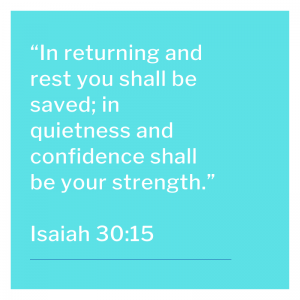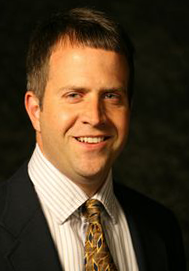When Jesus was on earth, He told us not to worry about tomorrow—what we’ll eat and drink, what we’ll wear, how we’ll pay our bills, how we’ll have time to get everything done. But what happens when we place ourselves in situations where we can’t help worrying about these things? Perhaps Jesus’ admonition not to worry also means to be wise and cautious with the things of earth so that our minds are not constantly filled with anxiety about them—so that they don’t become too important to us.
A Christian doctor, Richard A. Swenson, wrote a powerful book, Margin, about having spaciousness in our lives and finances, so when the unexpected happens we’re not completely stressed out.
The conditions of modern-day living devour margin,” writes Dr. Swenson. “Marginless is being thirty minutes late to the doctor’s office because you were twenty minutes late getting out of the bank because you were ten minutes late dropping the kids off at school because the car ran out of gas two blocks from the gas station—and you forgot your wallet.
Margin, on the other hand, is having breath left at the top of the staircase and money left at the end of the month.
Marginless is the baby crying and the phone ringing at the same time; margin is Grandma taking the baby for the afternoon. Marginless is being asked to carry a load five pounds heavier than you can lift; margin is a friend to carry half the burden. Marginless is not having time to finish the book you’re reading on stress; margin is having the time to read it twice.
Marginless is fatigue; margin is energy. Marginless is red ink; margin is black ink. Marginless is hurry; margin is calm. Marginless is anxiety; margin is security. Marginless is the disease of the new millennium; margin is its cure.”[1]
Cutting Back
 The doctor who wrote this book practices what he preaches. Working in a stressful medical practice, he cut back his workweek to just three days. It meant giving up a big income and lifestyle, and it put him out of step with the heavy workload typically expected of physicians. But he has never regretted it.
The doctor who wrote this book practices what he preaches. Working in a stressful medical practice, he cut back his workweek to just three days. It meant giving up a big income and lifestyle, and it put him out of step with the heavy workload typically expected of physicians. But he has never regretted it.
Now a lot of us probably wish we could back down to a three-day workweek! But the issue isn’t necessarily just the number of hours or days we work. A lot of times it’s the type of work we do, and the levels of mental and emotional stress associated with it.
Dr. Swenson writes:
A person can work 12 hours a day, six days a week for an entire life at physical labor and suffer no ill effects—as long as that person has decision control over the work schedule. Actually such hard physical labor would usually have salutary health benefits. But if the strain is mental and a person is constantly being frustrated, the negative healthy effects can be catastrophic. . . . In one study that compared physical exertion with mental exertion, a patient was first given a cardiac treadmill exam. Despite vigorous physical exercise, the patient’s cardiovascular status remained normal throughout. He then was asked to (stand still and) subtract seven from 777 serially for 3.5 minutes. His blood pressure went up forty points.
Swenson explains that no one talked much about stress prior to the 1950s. But since that decade we’ve been increasingly inundated with not only mentally taxing work but a bombardment of noise from our culture and media. Our minds and bodies weren’t designed to handle such a frantic pace. We were created to follow the natural cycle of the day: working with the sunlight and then resting in the evening shadows. Jesus Himself modeled this schedule: “In the daytime He was teaching in the temple, but at night He went out and stayed on the mountain called Olivet.” (Luke 21:37, NKJV). But with the invention of electricity, our workdays never really end.
In the wired-up culture in which we live, we may not even realize the pressure we feel to be doing multiple things at the same time. Once when I was speaking at a church, I asked the congregation, “How many of you have used your phone or other gadget since the start of our worship service today—either to text, talk, or surf?” Of the approximately 300 congregants, about 100 of them raised their hands—many of them students.
I didn’t ask that question to condemn anyone. I’ve used my phone during church too. And as someone who works with students, I’ve actually come to see that doing several things at once isn’t necessarily a sign of blatant disrespect as it used to be. It’s often just the way we’re conditioned: we’ve become accustomed to doing several things at once—to filling any possible gaps with busy-ness.
The Happiest Place on Earth
A few years ago an ecological group called the New Economics Foundation decided they were going to try to find out what was the happiest place on earth. They set up what they called a “happy planet index” that tried to measure what people put into a place (the resources) vs. what they get out.
 Out of 178 nations surveyed, the happiest place on earth was determined to be the small Pacific island nation of Vanuatu. Vanuatu was followed by Columbia, Costa Rica, Dominica, and Panama. Out of 178 nations, the U.S. ranked 150. In fact, none of the G-8 industrialized nations made the top 50.
Out of 178 nations surveyed, the happiest place on earth was determined to be the small Pacific island nation of Vanuatu. Vanuatu was followed by Columbia, Costa Rica, Dominica, and Panama. Out of 178 nations, the U.S. ranked 150. In fact, none of the G-8 industrialized nations made the top 50.
Prior to this study, the island of Vanuatu was known primarily for inventing bungee jumping. (They use vines, not elastic ropes.) But the happy planet index cited other reasons for happiness, such as the moderate pace of life. In Vanuatu, things are done in the time they naturally take, and people have great respect for the land they live in. Vanuatu has beautiful coastlines and rainforests. (It also has no income tax.)
Here’s the interesting part. Vanuatu actually has high unemployment rates and poverty. It’s a third world county. It’s economy is ranked 207 out of 233. But as one expert noted, “If you don’t have money in Vanuatu you can still live happily. You can grow everything you need to eat. If people have an opportunity to make money, they will take it, but it is not their ultimate aim.”
The national motto of Vanuatu is “We stand with God,” and the national anthem is called “Yumi, Yumi, Yumi,” which means “We, We, We.”
We don’t have to live in Vanuatu to be happy. We can choose a more spacious lifestyle wherever we live and work. A few years ago, a friend of mine I’ll call Tom was telling me how much pressure he used to feel to keep up with other families: to have a lucrative job and all the toys. For many years he strived to attain this level of living and eventually took a job in which he traveled most of the week. Finally, he just decided, “No.” I’m going to let go of this stress and just be me. He took a modest paying job at a mobile phone store, which he enjoyed. His family bought a small house, his wife homeschooled, and he was home each day by 4:30 without bringing with him much stress from work. Tom was a new person, and his family was a new family.
Having space in your life might mean saying no even to good things. Having space in your budget might mean settling for a house or lifestyle that humbles you, but humility too is part of the kingdom of God that Jesus told us to seek.
The title of this piece is “What would you do with space in your life?” In a way, this was a trick question. The answer is: Nothing. If you can achieve spaciousness in your life, protect it. Preserve it. Do whatever you have to do to put your earthly needs at rest so you can devote your minds to seeking the kingdom of God.
“In returning and rest you shall be saved; in quietness and confidence shall be your strength” (Isaiah 30:15, NKJV).
___________________________
[1] Swenson, Richard A. Margin: Restoring Emotional Physical, Financial, and Time Reserves to Overloaded Lives. NavPress, 2004.
___________________________
Andy Nash is an author, professor, and pastor who leads summer study tours to Israel.
###
The Premier Collection from Thomas Nelson and Zondervan offers beautiful Bibles created with premium materials, fine designs, and the exclusive Comfort Print® fonts. Learn more at www.PremierCollectionBibles.com.






